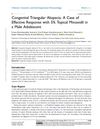1 citations,
February 2022 in “Journal of the American Academy of Dermatology” Taking biotin supplements can be risky and often lacks evidence of effectiveness for skin, hair, and nail issues.
[object Object]  1 citations,
June 2021 in “Journal of Cosmetic Dermatology”
1 citations,
June 2021 in “Journal of Cosmetic Dermatology” Enzyme booster SULT1A1 greatly enhances hair regrowth with minoxidil.
 1 citations,
October 2020 in “Journal of The American Academy of Dermatology”
1 citations,
October 2020 in “Journal of The American Academy of Dermatology” Balding might help identify men at higher risk for severe COVID-19, but more research is needed.
 1 citations,
April 2018 in “Journal of Investigative Dermatology”
1 citations,
April 2018 in “Journal of Investigative Dermatology” People respond differently to hair loss treatment with PRP because of individual differences in growth factors from platelets.
 October 2024 in “International Journal of Research in Medical Sciences”
October 2024 in “International Journal of Research in Medical Sciences” The SULT1A1 enzyme booster improves minoxidil effectiveness in treating hair loss, especially in females.

Higher sulfotransferase enzyme levels predict better response to minoxidil for hair growth.
 September 2024 in “Skin Appendage Disorders”
September 2024 in “Skin Appendage Disorders” Tofacitinib helped a woman regrow her hair without relapses after other treatments failed.
 May 2024 in “Clinical, cosmetic and investigational dermatology”
May 2024 in “Clinical, cosmetic and investigational dermatology” 5% topical minoxidil effectively treated a boy's congenital triangular alopecia without side effects.
 January 2024 in “Authorea (Authorea)”
January 2024 in “Authorea (Authorea)” STK11 gene polymorphism does not predict metformin response in PCOS.
 December 2023 in “Acta dermato-venereologica”
December 2023 in “Acta dermato-venereologica” Tofacitinib is effective for treating alopecia areata, and starting treatment early may improve results.
 June 2023 in “Pharmaceuticals”
June 2023 in “Pharmaceuticals” Men and women respond differently to drugs for COVID-19, high cholesterol, and diabetes, which suggests a need for personalized treatments.
 April 2023 in “Journal of Investigative Dermatology”
April 2023 in “Journal of Investigative Dermatology” COVID-toes show a unique immune response over time, different from vaccine-related chilblains.
 January 2023 in “Al-Azhar International Medical Journal /Al-Azhar International Medical Journal”
January 2023 in “Al-Azhar International Medical Journal /Al-Azhar International Medical Journal” Panoramic Trichoscopy is a new, better way to assess widespread hair loss.
 July 2022 in “The journal of investigative dermatology/Journal of investigative dermatology”
July 2022 in “The journal of investigative dermatology/Journal of investigative dermatology” Particulate matter causes inflammation in hair cells, potentially harming hair growth.
 June 2022 in “Biomedical reports”
June 2022 in “Biomedical reports” STK11 gene variations do not predict how well metformin will work for PCOS, but may affect hair loss and excess hair growth.
 August 2020 in “Research Square (Research Square)”
August 2020 in “Research Square (Research Square)” Oxygen levels affect hair growth and color cells differently when they interact directly.
 April 2020 in “Research Square (Research Square)”
April 2020 in “Research Square (Research Square)” Women with PCOS may have a reduced ability to fight breast tumor cells over time.
 April 2019 in “The journal of investigative dermatology/Journal of investigative dermatology”
April 2019 in “The journal of investigative dermatology/Journal of investigative dermatology” Machine learning can predict how well patients with alopecia areata will respond to certain treatments.
 June 2018 in “Surgical Case Reports”
June 2018 in “Surgical Case Reports” S-1 treatment led to a complete response in pancreatic cancer with manageable side effects.
April 2017 in “The journal of investigative dermatology/Journal of investigative dermatology” Researchers found three different ways drugs work to treat hair loss from alopecia areata and identified key factors for personalized treatment.
 January 2016 in “Hair transplant forum international”
January 2016 in “Hair transplant forum international” The document's content cannot be processed or understood.
 July 2011 in “Hair transplant forum international”
July 2011 in “Hair transplant forum international” The document's conclusion cannot be determined from the provided text.
December 2008 in “Al-Mağallaẗ al-ʻirāqiyyaẗ li-l-ṣaydalaẗ” Antioxidants improved hair growth in alopecia areata patients regardless of disease duration.
 July 1989 in “British Journal of Dermatology”
July 1989 in “British Journal of Dermatology” Women's acne improvement with antibiotics is not linked to signs of high male hormones.
January 2022 in “Social Science Research Network” Potassium channel modulators mostly increase the activity of rat whisker mechanoreceptors.
September 2017 in “The journal of investigative dermatology/Journal of investigative dermatology” EGFR inhibitors cause skin issues and hair loss by weakening skin defenses, suggesting antibiotics and targeted treatments can help.
[object Object] March 2023 in “The Journal of Urology” Higher SRD5A2 expression predicts better response to finasteride in treating urinary symptoms.
December 2021 in “Faculty Opinions – Post-Publication Peer Review of the Biomedical Literature”  January 2017 in “Faculty Opinions – Post-Publication Peer Review of the Biomedical Literature”
January 2017 in “Faculty Opinions – Post-Publication Peer Review of the Biomedical Literature” 60% of women who didn't respond to 5% minoxidil for hair loss showed significant improvement with a 15% minoxidil solution.
 April 2016 in “Journal of Investigative Dermatology”
April 2016 in “Journal of Investigative Dermatology”






















